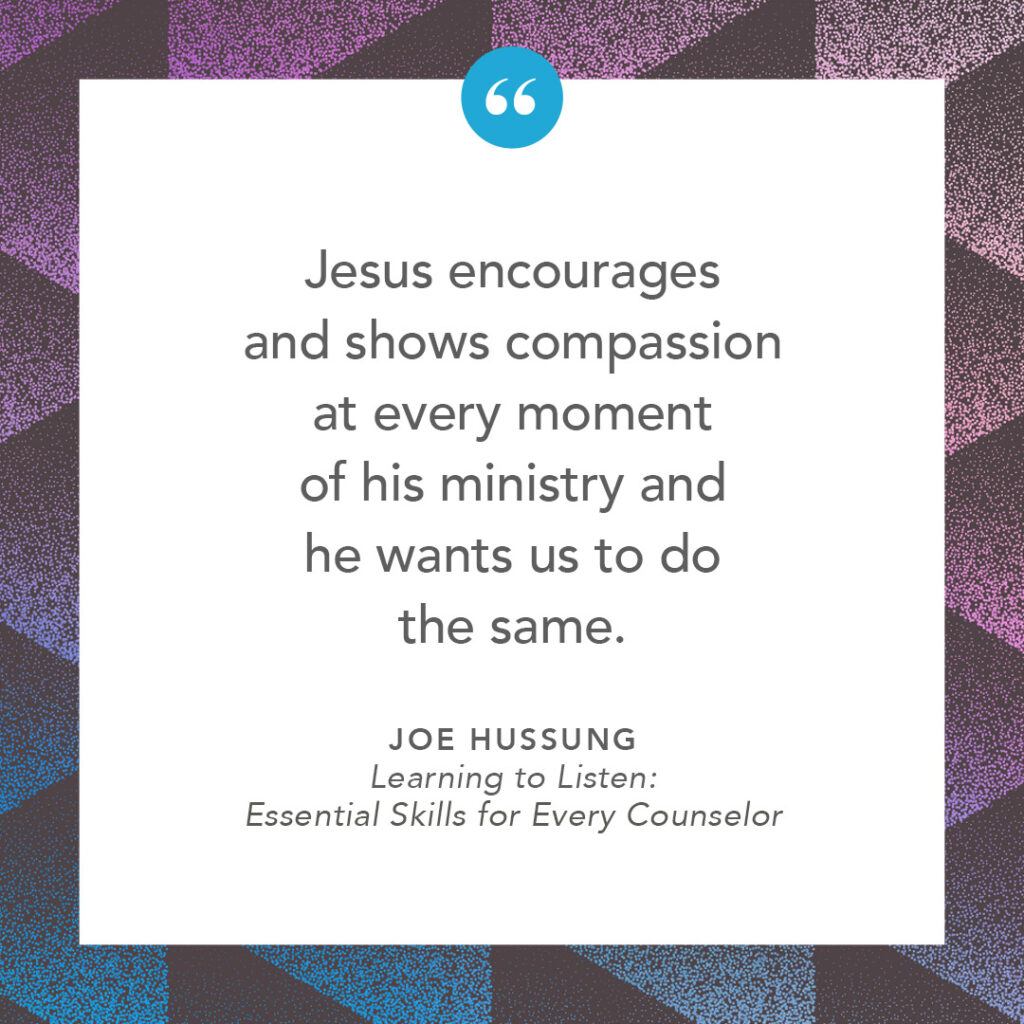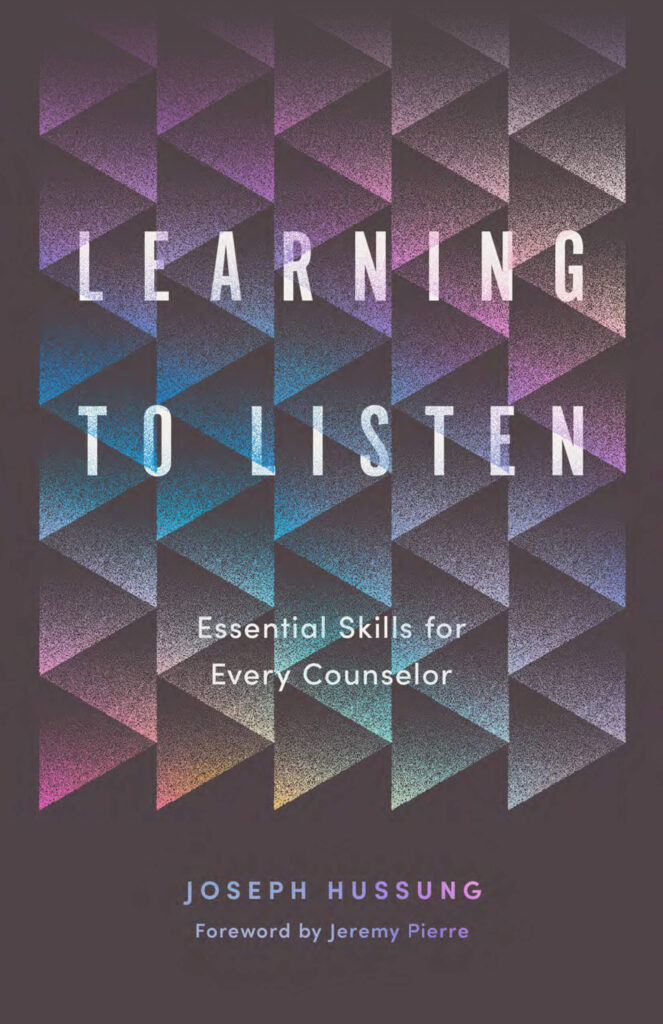Counselors have a high calling to love and care for people who are struggling in a fallen world. A wise biblical counselor draws out the deep attitudes of the heart and encourages their counselees toward growth into the image of Christ. Learning about specific problems, sharing Scripture, and sitting with suffering people are all important parts of counseling. While all of these elements are essential to the counseling task, counseling will ultimately fail without the simple yet vital skill of listening well.
In Learning to Listen: Essential Skills for Every Counselor biblical counselor Joe Hussung offers counselors the biblical principles and core skills necessary to become the active, compassionate listeners counselees need.
Q: How is your new book, Learning to Listen, different from other counseling resources available?
Many books in the biblical counseling world focus on the broad method of counseling, others focus on counseling theory, still others focus on specific presenting issues. Learning to Listen is unique in that it focuses specifically on skill development and grounding. Instead of asking, “What does the Bible say about issue?” It asks “Why is this particular skill biblical and necessary to what we do as uniquely biblical counselors?”
Counseling skill development isn’t new in the biblical counseling world, but very little ink has been spilt writing about it and developing a place within a biblical counseling framework. There are some larger works and introductory books that have chapters devoted to developing the counseling relationship, good questions to ask, or the character necessary to listen well, but none of those dedicate a book-length treatment of a specific category of skills like Learning to Listen.
Q: Why is listening the ultimate skill that a counselor needs to develop well?
While ultimate may not be quite the right word, listening is the THE foundational skill in biblical counseling. That means, even though there are other skills that counseling can rise and fall on, listening is first all-encompassing. It isn’t an introductory skill that only happens in the first couple of sessions. Everything we do in counseling is listening and then responding. Without listening, we don’t go anywhere in the counseling process.
Second, it is foundational because it is the starting point that all we do in counseling pivots off. What we hear about a counselee is what drives our hearts in counseling toward compassion. It drives us to the places in scripture we might go in order to bring about relief. It effects the nuance and balance of the truth that we give them. If we miss something in our listening, then everything else can potentially fail because we have missed learning where the counselees are, and if we miss where they are, we miss the direction we need to point them.
Q: Is Learning to Listen only a book for counselors? Who else would benefit reading this book?
Learning to Listen is a book for every person that is in a helping relationship and wants to offer counsel to someone else. The book certainly uses counselor/counselee language and also deals with some uniquely formal counseling questions, however, everyone counsels. Parents counsel children. Pastors counsel their church members. Spouses counsel one another. Friends counsel friends. These relationships have informal times and formal ones, and much of what is in this book can span the different relationships and contexts of counseling.
In particular, the first two-thirds of Learning to Listen is for anyone who simply wants to become a better listener by looking at questions such as: Why does God listen? What does that mean for us when we listen? What are some ways that sin typically gets in the way of our listening? What kind of heart did Jesus display in listening? These are all immensely important things for all of us to consider as we try to be better listeners in our interpersonal relationships as well as counseling relationships.

Q: A lot of people may not have ever given thought to there being a theology of listening. Please explain the basics of the theology of listening as presented in your book.
A theology of anything is simply considering the ways in which this thing we are consider (listening in this example) is related to God. So, when we want to consider this, we need to consider “does God listen to us?” “If so, why in the world would he do that?” “Isn’t he too important to consider our needs and desires?” “What role does listening play in our design as human beings?”
All these questions need answers, so here are some basic things we are thinking about in a theology of listening. God listens to us. He doesn’t do that in the same way we do. He is omniscient, so he doesn’t receive sound waves into his ear, consider what he hears, and then respond like we do. Instead, God knows. He knows everything we say, what we think, the truth of circumstances from which all of that arises. And he wants us to know that he listens. He communicates that to his people often in scripture. He tells Hagar that he heard Ishmael’s cry. He tells Moses that he has heard the cries of the Israelites and multiple others in scripture. So, a theology of listening grounds our listening in a God who listens and communicates that act of listening to people to show them that he cares for them.
Q: What can we learn from Job’s three friends about how sin distorts our ability to listen well?
There are lots of things that we can learn from Job’s friends, mostly what not to do. They start off well enough as they sit with Job in grief, but when they open their mouths, they just don’t offer much comfort to their friend. Here are a few helpful take-aways from Job’s friends:
First, Job’s friends speak too soon. This may be shocking because they sit in silence with Job for quite a while. However, speaking too soon isn’t necessarily about timing per se. It is more about waiting until you actually know what is happening. You need to have enough information about what is going on before trying to give an answer. Job’s friends didn’t understand the reality and depthe of the situation (Job’s loss of his family, health, and posessions), and because of that, they misdiagnosed the problem.
Second, Job’s friends give pretty simplistic answers to a complex problem. Because they haven’t listened to understand, they give a simple answer, ”Job you must have sinned, because God punishes guilty people.”
Third, even when Job gives a defense, the friends double down on their assessment. They are too proud to pivot when told they are wrong in what they are saying. Instead, they continually tell Job he is the author of his own suffering and deserves what he is getting. It may be helpful before we forget—much of what Job’s friends say is true, but not true of Job. They aren’t entirely wrong, but because they applied the wrong truth to Job’s life, he was not listened to and was hurt in the process.
Q: Why is your posture while listening important? What can we learn from the posture of Jesus when he ministered to others?
Heart posture is important in listening because it is the place from which all of our care and love for a person comes. When Jesus teaches on what the Christian life should look like, he is concerned with both the actions that we take and the heart from which these actions arise.
Consider the Sermon on the Mount. Jesus tells the people not only to not commit adultery, but also not to lust. This is a heart posture that is off. If we merely abstain from a particular sin while desiring that sin, we haven’t actually done what God has required of us. In the same way, if we do the act of listening well, but do it for an evil purpose, then it is not the kind of listening that God does with us, nor is it honoring him.
Jesus exhibits the heart of a good listener. When Jesus interacts with sinners and sufferers in the New Testament, he always does so with gentleness, patience, compassion, and love. When we look at Jesus and the way he engaged with people, we see a pattern to be emulated, and part of that pattern is the heart postures that describe his engagement.
Q: What three fruits of the Spirit are especially helpful when it comes to listening? Why does each characteristic make us a better listener?
In Learning to Listen, I identify three specific characteristics that we find in Jesus that are helpful for listening. This isn’t meant to be an exhaustive list, but these three heart postures can help us to stay where we need to be in listening. Humility, patience, and gentleness help us to listen well as well as avoid pitfalls in our listening.
Humility prioritizes the other person. Many times scripture starts with humility when it comes loving other people (Philippians 2 being a good example of this). Humility also means accepting my creaturely limitations. We can’t know everything. We certainly can’t know much about the person we are trying to help without engaging them.
Patience doesn’t rush the process. Patience is not passive, although it feels like it is, due to the fact it is about what we don’t or can’t do. It is the active withholding of action until it is the right time. If we aren’t patient, then oftentimes we speak too soon, before we have understood the other person.
Gentleness treats the person who is in front of us with the care and sensitivity that they deserve. God declares that he will not break bruised reeds or snuff out smoldering wick. We should be the same. We should be gentle with the people we are called to care for.
Q: You write that in building any skill there is preparatory work to be done. How does a person prepare to listen?
There are lots of things that we can do to prepare for listening, but I’ll address two big areas. First, we should consider ourselves before ever trying to help someone else. This is important because it is only out of the comfort we have received in the Lord ourselves that we can counsel others to receive comfort from him. We need to consider ways that our story and the specific pressure points we have experienced may overlap with those we are speaking to. These overlaps can, at times, make it harder for us to listen, so we should consider what God is doing in our hearts and lives before trying to listen to someone. If something feels big and difficult today in our own lives, can we set that aside as we meet with this person? How can we rely on God to keep our hearts and minds focused during the session on what God is doing there, instead of what feels hard in our own lives?
Another important thing we should consider in preparing for listening is thinking through the types of things that we should be listening for. There are obvious things, such as we should be listening for their story. What brings them to counseling? This is really hard, but I think we should also consider “the gaps,” meaning we should be listening for things in their values, perspectives, and contexts that we don’t inherently understand. We should understand how this person approaches the world. What drives them? What are they reaching for? How have cultural and familial influences shaped the way they see the world? These are all things that will be helpful as we try to help this person make sense of their world.

Q: Please explain the acronym GRACE that reminds us of what we should be doing physically while listening.
GRACE is an acronym that helps us to remember physically what can communicate that we are listening to the person in front of us.
G – Gaze. Eye contact is very important. As you counsel someone, you want to maintain undistracted eye contact. This means that although we shouldn’t stare daggers at them, we should not allow our eyes to wander in obvious places that communicate being distracted. Don’t continually look up at the clock, down at your watch or phone, or through the window to see who is walking by. Stay connected with your gaze.
R – Relax. Don’t be too stiff. Make sure your entire body is positioned in such a way that shows you take the conversation seriously, without making it feel like an interrogation. That includes your facial expressions. You don’t want to have an entirely flat, expressionless face. Instead, you want your face to show concern and compassion and follow the flow of what they are sharing; be that joy, humor, or grief.
A – Align. Make sure that your shoulders and the rest of your body aligns with theirs. Don’t turn away. Facing the person and squaring your shoulders tells the other person that you are ready to listen and aren’t engaged in anything else.
C – Connect. Connecting is all about interacting with the content of what’s being said by your counselee. A slight lean forward, a nod of the head, or a verbal “mhmm” shows that you are tracking with what they’re saying and can be helpful ways to communicate connection with your counselee.
E – Engage. Engagement is all about communicating with our body-posture. Specifically, what our arms and legs are doing. When listening to others, it is helpful to make sure that we do not communicate being closed off and disengaged. Many people interpret our arms or legs being crossed as a sign of being closed off and judgmental. So sitting like that can be counterproductive. Try to keep your physical posture open and engaged with your counselee.
Some of these physical cues are socially different depending on where you are counseling or the culture that you are counseling in. So you can adjust them. The goal is not to think of these as ridged rules but a starting point that you can pivot from if needed.
Q: Being a good listener also means we respond well. It’s easy to understand why affirmations are a positive response but tell us why you think confrontations can also be a good thing.
Confrontation is a necessary component in any relationship, but many times we inherently think of confrontation as bad, or scary. Really confrontation is simply drawing attention to someone’s problem. It is asking the question that was first posed by Paul David Tripp “What does this person need to see about themselves, God, others, or their world, and how can I help them see it?” We confront people because there are things they will need to see and part of our role as counselors is to help them see it.
Sometimes they need to see a personal sin that they have been engaged in that has brought about times of difficulty and struggle. Other times they may need to see how others’ sins have affected them without taking the burden of responsibility onto themselves for things someone did to them. Still other times they need to see that they are missing God’s goodness, love, and kindness in the midst of immense suffering.
Confrontation doesn’t have to be all about confronting sin, it can also about just helping them cut through the confusion of their life’s circumstances so they can turn to God for help.
Learning to Listen
In Learning to Listen, biblical counselor Joseph Hussung gives readers a theology of listening and explains the purpose, posture, and practice of this essential counseling skill. If counselors do not truly hear the hearts of their counselees, they won’t understand the nuanced struggles at play nor how to apply biblical principles. Listening well enables counselors to love well and understand with empathy.






